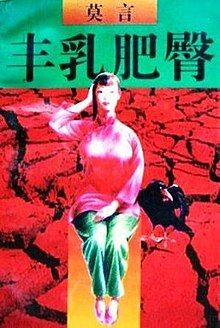Novel by Mo Yan
.mw-parser-output .hidden-begin{box-sizing:border-box;width:100%;padding:5px;border:none;font-size:95%}.mw-parser-output .hidden-title{font-weight:bold;line-height:1.6;text-align:left}.mw-parser-output .hidden-content{text-align:left}You can help expand this article with text translated from
the corresponding article in Chinese. (August 2013) Click [show] for important translation instructions.
Machine translation, like
DeepL or
Google Translate, is a useful starting point for translations, but translators must revise errors as necessary and confirm that the translation is accurate, rather than simply copy-pasting machine-translated text into the English Wikipedia.
Do not translate text that appears unreliable or low-quality. If possible, verify the text with references provided in the foreign-language article.
You must provide
copyright attribution in the
edit summary accompanying your translation by providing an
interlanguage link to the source of your translation. A model attribution edit summary is Content in this edit is translated from the existing Chinese Wikipedia article at [[:zh:丰乳肥臀]]; see its history for attribution.
You should also add the template ((Translated|zh|丰乳肥臀)) to the
talk page.
For more guidance, see
Wikipedia:Translation.
Big Breasts and Wide Hips is a novel by Mo Yan. It won the Dajia Honghe Literature Prize in 1997. The book tells the story of a mother and her eight daughters and one son, and explores Chinese history through the 20th century. The novel enthusiastically praises the original creator of life—the greatness, simplicity and selflessness of the mother, and the unparalleled significance of the inheritance of life. And in this flow chart of life, filled with the smoke of history and war, it is true, without any prejudice, and reproduces the history of a period of time. In 1997, Big Breasts and Wide Hips won China's Master Literature Award.
Reception
Big Breasts and Wide Hips received near universal critical acclaim from Western literary critics who praised Mo Yan's inventive storytelling and use of his unique style of magical realism to describe the surrealism the average Chinese peasant felt living under the Japanese occupation.[1][2]
Contributor for The Guardian, Paul Mason declared Mo Yan to be the Chinese equivalent of Thomas Pynchon, concluding that Mo Yan was "unlike any of the great living authors."[3]
Jonathan Yardley of The Washington Post praised Mo Yan's dedication to feminism throughout the novel, but offered numerous reservations about the quality of the novel. Most of Yardley's criticism focuses on the stale prose and clumsy characterization of Jintong.[4]
